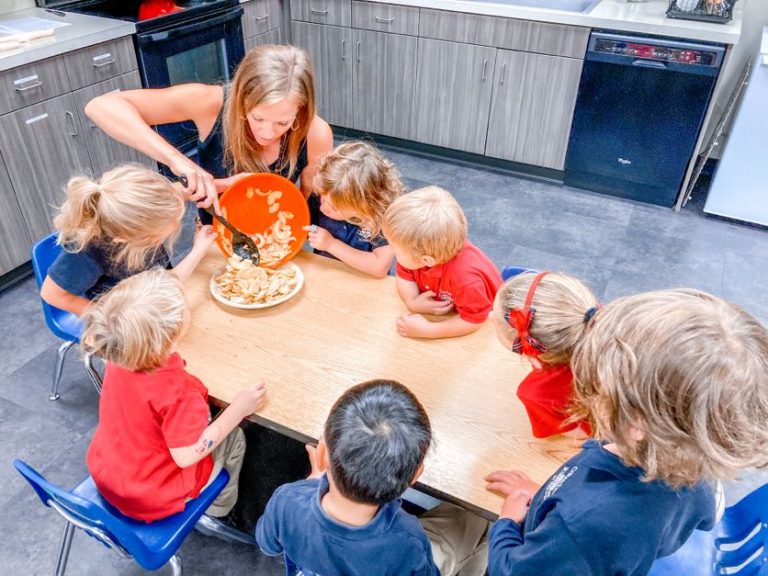This article is adapted from a talk given at CDA Fall Curriculum Night 2022, a time where the faculty and parents of Coram Deo Academy come together to learn and grow as we educate our students in partnership.

By Jason Barney
“House into Home: Paideia” is our theme for this year. It’s kind of a cryptic theme in some ways, but if we think about House into Home for a minute, perhaps it will start to make sense. What makes a house your home? Familiarity, comfort, relationships, habits, suiting your preferences. In essence, your family culture. Culture is an interesting word in English, coming from a Latin root word meaning to till the earth, to cultivate, to care for or even to worship. One of the things we have in mind with culture as a faculty and staff is the Greek word paideia.
Werner Jaeger the distinguished German-American classicist wrote a three-volume work entitled Paideia: The Ideals of Greek Culture. Paideia, to the Greeks, meant something more than education; it meant something like enculturation. Whether in a family or in a school it is not just about what is taught, but what is caught. It’s not just the classroom that teaches students, it’s the books and movies, the customs and conduct of a whole culture. It’s the air we breathe in, or as Charlotte Mason said, education is an atmosphere, a discipline, a life.
In Ephesians 6:4 the apostle Paul writes, “Fathers, bring up your children in the paideia and instruction of the Lord.” When he uses that word paideia, he most likely has in mind this broader meaning of education as enculturation. Paul is calling for the holistic upbringing of children by their parents in a counter-culture that is governed by the Lord Jesus.
Culture Shapes Our Students
This has enormous implications for what we do as parents and teachers at Coram Deo Academy, but it also has implications for your family home and culture. In fact, I don’t think I’m overstepping to say that if the families of the school by and large have a culture that simply goes along with the postmodern anti-Christian assumptions of the surrounding culture, then it is unlikely that CDA will graduate Contagious Christians and Legacy Leaders.
But I doubt that I need to convince you that your family culture matters, and I highly doubt that there is anyone in this room who doesn’t want a thriving family culture that focuses on Christ, enjoys rich relationships, and avoids our culture’s transactional isolation of individuals in a family from one another. So, I want to take a few minutes to begin a conversation with you about a few transformative practices that I think will help us all in cultivating that Thriving Family Culture in Christ that we all want for our families.
I’m definitely not an experienced authority on family culture, as my oldest is in kindergarten, but I’m aware of a few practices that I think are pretty common sense, but are easier said than done. And therefore, we can always use some reminders of what we already know to be true, because frankly they’re difficult in our contemporary culture.
So here are 5 Cs for a Thriving Family Culture. I’ll just mention them, explain each just a little bit, but mostly let you take these ideas and apply them as makes sense for your own family culture. I think it’s worth saying that every one of our family cultures should be different, should be colored by our own particularities and gifts, just like our homes should be different from one another, even if the principles that make a thriving Christian family culture are the same.
1. Curate Your Content
We often think negatively about objectionable content and how we as parents need to act as the gatekeepers to censor that objectionable content for our kids. And that is true and important, but I like the idea of curating because it captures the positive too. Like a Museum Curator we should not only be the gatekeepers to keep out what is ugly and ignoble and base, but we should also be looking out to find and treasure great content: good classic books, uplifting and thought-provoking movies, audiobooks.
I’ve been reading aloud C.S. Lewis’ The Chronicles of Narnia. My wife finds great classic shows like Mr. Rogers from the library for free. Yes, we all need to be reminded to minimize screen time, but part of what I’m saying here is that we need to be intentional about finding the positive sources of inspiration for our children and our family as a whole.
Whatever is true, whatever is noble, whatever is right, whatever is pure, whatever is lovely, whatever is admirable—if anything is excellent or praiseworthy—think about such things.
I love these words of encouragement from Paul in Philippians 4:8! As parents who want a thriving family culture, we should see ourselves as curators of good, true and beautiful content for our families. One great resource for this task is our classical reading list. Draw from it as you curate content for your family. Of course, most important here is to read the Bible together as a family and draw sustenance from God’s Word on a regular basis.
2. Converse Around the Table
In our crazy busy world of school and church activities, sports and extracurriculars, we have to be intentional to about family dinner and family conversations. I think we all know implicitly that rushing around from activity to activity takes its toll on our family culture. I’m not saying it’s easy; there are evening activities that have legitimate claims on us.
But we all should fight against the takeover of the family dinner table. And it’s not just a matter of having dinner together in the same room. I’ve gone to restaurants and seen families where each member is on a device the whole time. No, the point is to actually converse, to have good old-fashioned conversation. This is the type of thing that is more awkward the less you do it, so it can be hard to start. But once it is part of your family culture it feeds itself.
One tool that we’ve found helpful is family conversation starters cards, even with our young kids. Lead the way as a parent in sharing and conversing. Tell your kids about your day and about your work; it’s not above their heads. Narrate something you recently read or watched and what you found interesting. Ask them questions. Many questions. Follow-up questions. Conversations around the table will breathe life into your family culture.
3. Cooperate on Projects and Activities

Some of the best ways to bond together as a family are when you work together on something. Do a weekend art project. DeAnna Gipson shared some great ideas for this last year at a Curriculum Night. Go on some sort of adventure. Bake a pie and include the kids in the process. Do work around the house and give your kids jobs. When people work together, they bond. Projects and activities create opportunities for teaching your kids common arts skills and discovering new interests together.
Cooperation is an incredibly powerful tool in establishing a positive family culture that, I think, we often overlook. In our contemporary culture, we outsource everything. But cooperative activities, like starting a family garden or what have you, can be transformative in the attitudes and relationships of the family. Getting entertained together is great, but working hard on a shared project together is beautiful. One of our CDA moms, Jen Hutson, has written extensively about creative ways to bring your family together. Read her articles about becoming a novice taxidermist and naturalist or surviving an apocalypse!
4. Correct Your Children

This is where I get a little saucy. A healthy family culture includes the biblical vision of parents as those who wisely instruct and correct their children. Read the book of Proverbs. The father and mother’s instruction and correction, warnings and encouragements are necessary ingredients in a Christian upbringing. Paul tells fathers specifically to bring up their children in the discipline and warning of the Lord. We live in a world that is uneasy with proper parental authority. Leonard Sax, a medical doctor, chronicles this disturbing cultural trend in the marvelous book The Collapse of Parenting. Needless to say, I’m sure I’m preaching to the choir in this room. But I think even we need to be reminded to warmly and joyfully correct our children as part of healthy parenting and a thriving family culture.
Let me give you an example. Whining and complaining need to be corrected. As parents we should kindly but firmly insist that our children ask for things in a respectful voice. Pull a Mrs. Kilmer, put on your Mary Poppins chap and say, “Nope, we’re not going to be speak that way. Try that again.” Parents, you’ve got to use our teacher trick of “Do It Again,” as a natural consequence, really a way of instructing your children on the best way to say and do things. You are training your children in habits. Don’t allow them to keep doing things in a way that poisons the culture. For their own good, correct them. For strong examples of habits of the heart, check out this series by our lead teacher, DeeDee Feeney.
5. Celebrate Family Memories
Deliberately taking time to celebrate memories as a family is a multiplier of everything else I’ve said. It seems so simple, but our kids absolutely love, love, love watching short little family videos that we took on our phones. When you do something cool as a family, ask your kids if they remember it a few days later and what they enjoyed. When you get to holidays, have some family traditions and take the time to tell stories of what you did last year and the year before. Maybe you’re not a scrap booker but find ways to make this an intentional part of your family life.
Celebrating family experiences will solidify the bonds of a thriving family culture and will provide the rich foundation of joy in your family relationships that will help you get through the inevitable tough times. I would be remiss if I didn’t mention intentional times of prayer, family worship, and gratitude to God for how he has been faithful to your family and guided you through every season.
Talk about these with your spouse. Hopefully this helps start a conversation about family culture that will inspire and encourage you as you seek to bring up your children in the paideia and instruction of the Lord.
RSVP for an Open House







